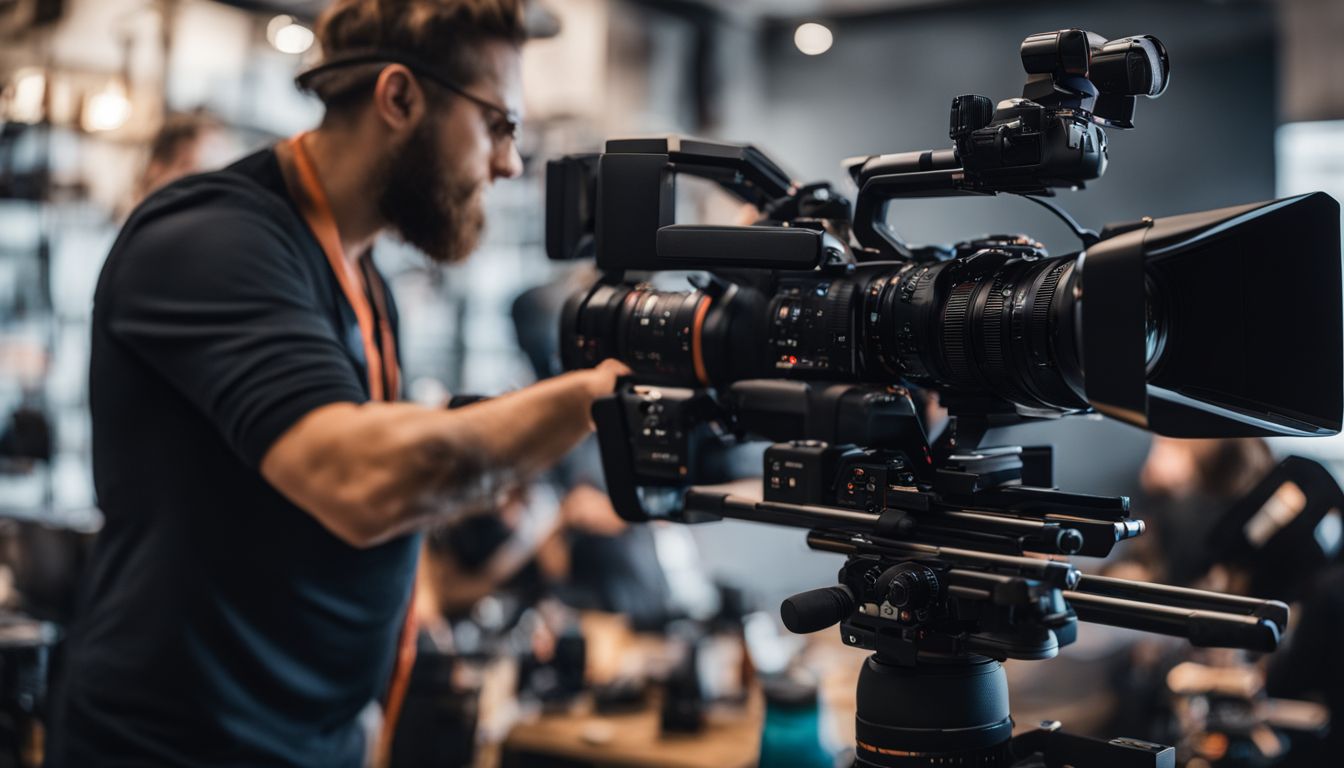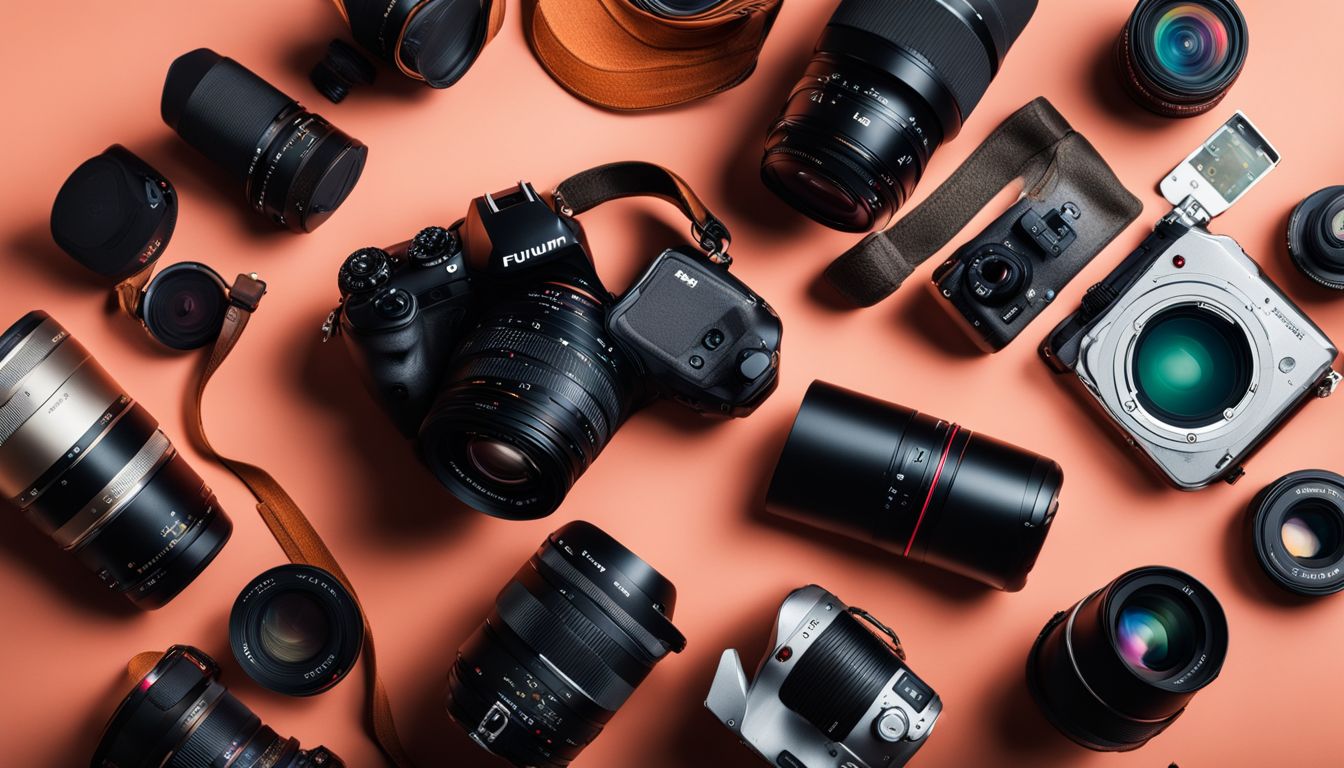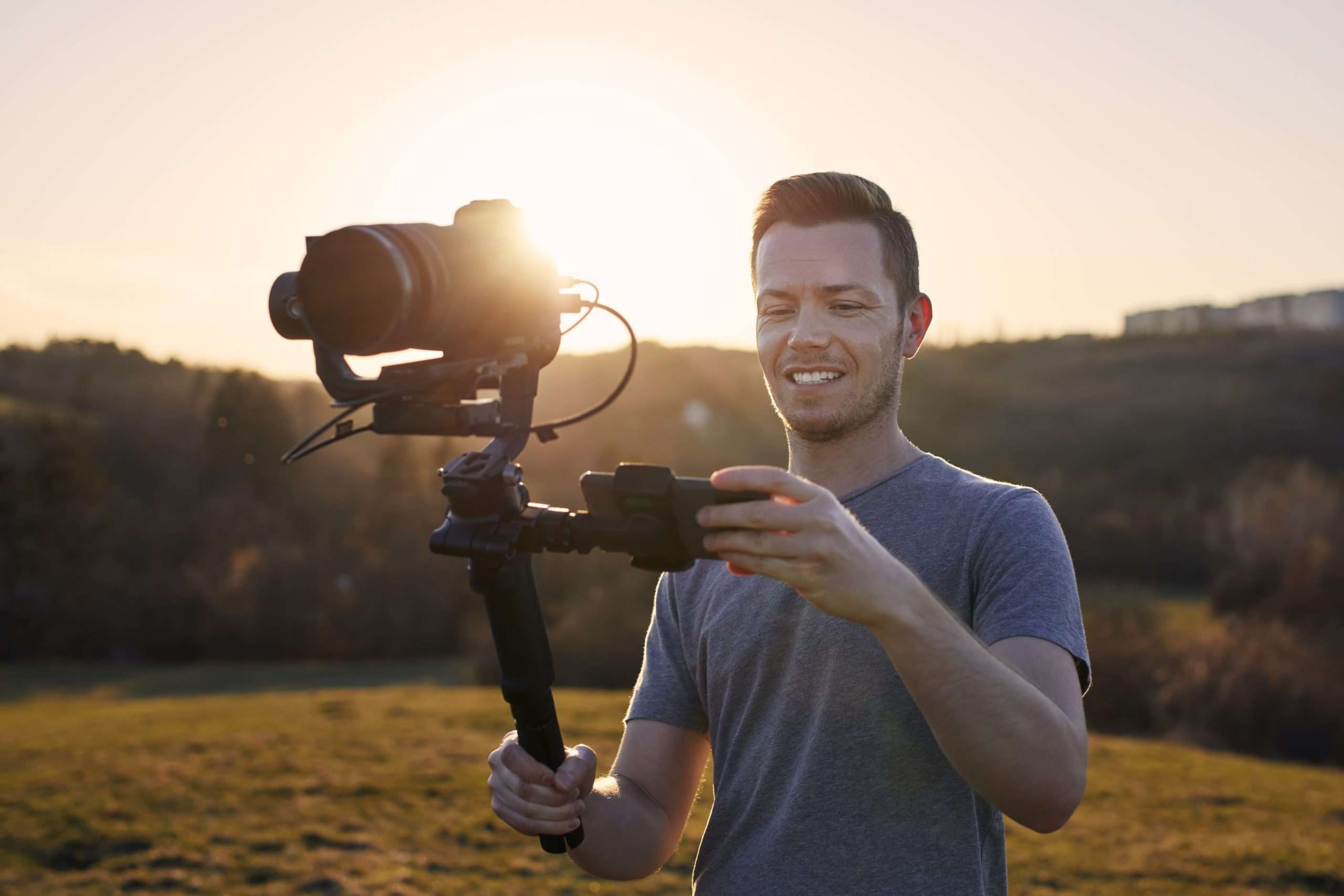Key Takeaways
- A videographer should have technical skills in areas such as videography, video editing, cinematography, and video production.
- Creativity is important for coming up with fresh ideas and storytelling through videos.
- Good communication and teamwork are essential for working with clients and team members effectively.
- Additional skills that can benefit a videographer include photography, motion graphics, audio equipment handling, graphic design, and lighting techniques.
Essential Skills for Videographers
 Videographers should have a strong foundation in videography, video editing, video production, cinematography and communication skills.
Videographers should have a strong foundation in videography, video editing, video production, cinematography and communication skills.
Videography
Videography is all about shooting great videos. You need the right skills to do this well. First, you have to know how your camera works. Each button and setting has a job. Knowing what they do helps you make better videos. Lighting is another big part of videography. Good light can make an okay video look amazing while bad light can ruin even the best shot. Creativity plays a huge role too. You have to think of fresh ideas for each video project so that it stands out from others. Apart from this, every good videographer must be able to tell a story through their work. Finally, let’s not forget about working with people! Be it clients or team members such as directors and actors – how well we communicate with them affects our work greatly.Video Editing
We use video editing to make our films better. We cut out parts that we don’t need and add in things like music or graphics. This is tough work, but it makes our videos look great! Video editing requires a good eye for detail and a lot of patience. To edit videos well, you need skills in software tools. Some popular ones are Final Cut Pro X and Adobe Premiere Pro. These tools help us give the final touch to the story we want to tell with our video.Video Production
Making videos is a big part of a videographer’s job. We use our skills to plan and make great films. To do this, we need to know how to use cameras, lights and sound gear. We also have to pick the best places for filming. Once we have all the clips, we put them together in a special way that tells a good story or shares an important message. Good video production is about using keen attention to detail and creativity at every step of the process! Being up-to-date with new tools and trends helps us create amazing videos that stand out.Cinematography
Cinematography is a key skill for a videographer. It’s about how to set up shots and use the camera in the best way. We need to know all about framing, angles, and movements. This helps us make videos look good. Good cinematographers also understand lighting techniques very well. Lighting plays a big part in setting the mood of a scene or highlighting important parts of it. To become great at cinematography, we not only learn these skills but also keep on learning with new trends and tools in our field.Communication Skills
Being good at speaking and listening is key for a videographer. We need to understand what our clients want. We also have to share our ideas with the team we work with. Good communication can make the work go smoother and faster. It helps avoid mistakes too. This skill lets us build trust with clients. Trust means they will come back to us for more work in the future. Other people on our team need to trust us too, so that we can all do our best job together.Additional Skills for Videographers
 In addition to the essential skills mentioned earlier, videographers should also possess additional skills such as photography, motion graphics, audio equipment handling, graphic design, and lighting techniques.
In addition to the essential skills mentioned earlier, videographers should also possess additional skills such as photography, motion graphics, audio equipment handling, graphic design, and lighting techniques.
Photography
Great photos add value to videos. They help tell a story. Clicking still pictures is like making small films. Both need an eye for detail and good light control. So, learning photography helps a lot in videography. It trains our eyes to spot nice frames and moments. We also learn about light, color, focus, depth and more. These skills are key in filming too! This makes us better at video work.Motion Graphics
We need to know how to work with motion graphics. These are moving or animated pieces of art. They make videos more engaging and fun to watch. To be good at this, we must be creative and have an eye for design. We should also learn about computer programs used for this kind of work. Tools like Adobe After Effects can help us add cool effects to our videos. It takes time and practice but it’s worth the effort!Audio Equipment
We also need to have knowledge and skills in using audio equipment. This includes understanding how to capture clear and high-quality sound during video shoots, as well as being able to record and mix audio effectively. We should be knowledgeable about different types of microphones, such as lavalier microphones for interviews or shotgun microphones for capturing ambient sounds. It’s important to know how to properly set up and position microphones to ensure optimal sound quality. Additionally, we should have a good understanding of audio editing software so that we can enhance the sound quality during the post-production process. Being proficient in handling audio equipment is essential for creating professional videos with great sound.Graphic Design
Graphic design is another valuable skill for videographers to have. It involves creating visual elements such as logos, typography, and illustrations that enhance the overall look and feel of a video. Being proficient in graphic design allows videographers to add creative touches to their projects, making them visually appealing and engaging for viewers. By using design principles such as color theory, composition, and hierarchy, videographers can effectively communicate messages and evoke emotions through visuals. Having knowledge of graphic design software like Adobe Photoshop or Illustrator is essential for executing these tasks efficiently. Mastering this skill can elevate the quality of videos and make them stand out in a competitive industry.Lighting
Good lighting is crucial for videographers to create visually appealing and impactful videos. Understanding lighting techniques and how to manipulate them can greatly enhance the mood, atmosphere, and overall quality of a video. Videographers should have knowledge of different types of lights and how to position them effectively for optimal results. They should also be aware of natural lighting conditions and how they can work with or modify them to achieve the desired effect. Being proficient in using lighting equipment such as reflectors, diffusers, and filters is essential for creating well-lit scenes. Additionally, videographers need to have an eye for detail when it comes to lighting, ensuring that there are no harsh shadows or overexposed areas.How to Improve Videographer Skills
To improve videographer skills, we can engage in training programs and educational courses to enhance our technical proficiency and knowledge. It is also important to practice and experiment with different shooting and editing techniques to refine our craft. Networking and collaborating with other professionals in the industry can provide valuable insights and opportunities for growth. Lastly, staying updated with the latest trends in videography ensures that we are always adapting to new technologies and techniques.Training and Education
Training and education play a vital role in enhancing the skills of videographers. In this field, continuous learning is crucial to keep up with new technologies and industry trends. Videographers can benefit from attending workshops, courses, and seminars that focus on various aspects of videography such as filming techniques, video editing software, cinematography principles, lighting techniques, and composition. These opportunities allow videographers to expand their knowledge and acquire new skills that will ultimately help them produce high-quality videos. By investing in training and education, videographers can stay relevant in the industry and provide cutting-edge services to their clients.Practicing and Experimenting
To improve their videography skills, videographers should dedicate time to practicing and experimenting with different techniques. By actively filming and editing videos, they can refine their camera operation, composition, storytelling abilities, and technical proficiency. Experimenting with lighting setups allows them to understand how lighting affects the mood and aesthetics of a video. They can also explore various editing styles and effects to enhance their post-production skills. Through practice and experimentation, videographers can gain confidence in their craft and discover new ways to bring their creative vision to life. In addition to hands-on experience, networking with other professionals in the industry is also beneficial for videographers. Collaboration with fellow videographers or filmmakers provides opportunities for learning from each other’s experiences, exchanging ideas, and even potential partnerships on projects. Attending industry events such as workshops or conferences also helps videographers stay updated on the latest trends in equipment, software advancements, and emerging techniques. Continuous improvement through active practice ensures that videographers are always honing their skills while staying relevant in an ever-evolving field.Networking and Collaboration
Networking and collaboration are essential aspects for videographers to expand their professional connections and work effectively with others. By networking, videographers can connect with potential clients, industry professionals, and fellow creatives, which can lead to new opportunities for projects and collaborations. It is important to attend industry events, join online communities or forums, and actively engage in social media platforms to build a strong network. Collaboration is also crucial as videographers often work as part of a team that includes directors, scriptwriters, actors, and editors. Effective communication skills help in conveying ideas clearly and working together seamlessly towards a common goal. Collaborating allows videographers to leverage the diverse expertise of each team member while contributing their unique skills to create impactful videos that meet the client’s vision.Staying Updated with Industry Trends
To stay relevant and provide cutting-edge services, it is crucial for videographers to continuously learn and keep up with new technologies and industry trends. By staying updated, videographers can discover innovative techniques, equipment, and software that can enhance their video production process. They can also gain insights into popular styles of cinematography, editing techniques, or visual effects that are currently in demand. Additionally, being aware of the latest industry trends allows videographers to adapt their skills and services to meet the changing needs of clients. Whether it’s attending workshops, joining professional organizations, or following industry publications online, staying updated with industry trends helps videographers stay ahead of the game and deliver exceptional videos.Detailed Discussion on What Skills a Videographer Should Have
Videographers need to possess a range of skills to excel in their field. Firstly, they should have a strong understanding of videography, including filming techniques, composition, and storytelling. They must also be proficient in video editing and have the ability to produce high-quality videos through the use of software and technical skills. In addition to these core skills, videographers should also possess good communication and interpersonal skills. This is important as they often work closely with directors, scriptwriters, actors, and editors. Being able to effectively convey their vision and collaborate with others is crucial for success. Creativity is another essential skill for videographers. They need to be able to think outside the box and come up with innovative ideas for visual narratives or messages. Attention to detail is also important as they are responsible for capturing every aspect of a scene or event. Lastly, staying updated with industry trends and continuously learning new technologies is vital in order for videographers to provide cutting-edge services. By keeping abreast of the latest advancements in equipment and software, they can deliver high-quality videos that meet clients’ expectations. Overall, a successful videographer should possess a combination of technical proficiency, creativity, communication skills, attention-to-detail while being adaptable and capable of working within teams.Conclusion
In conclusion, a videographer needs a combination of technical and creative skills to succeed in the field. They should have expertise in filming, editing, cinematography, lighting techniques, and storytelling. Additionally, strong communication and interpersonal skills are crucial for collaborating with clients and teams. By continuously improving their skills and staying updated with industry trends, videographers can create captivating videos that leave a lasting impact.What Are the Essential Skills Needed to Start a Career as a Videographer?
To pursue a successful path in starting a career in videography, aspiring videographers must possess certain essential skills. Creativity is crucial as it helps in capturing engaging visuals and telling compelling stories. Technical proficiency in operating cameras, editing software, and other equipment is also vital. Additionally, having an eye for detail, good communication, collaboration, and time management skills are beneficial for working effectively in this dynamic field. Mastering these skills will enable individuals to embark on a promising journey in videography.
How Can Insightful Training Videos Improve a Videographer’s Skills?
Insightful training videos for skill enhancement can greatly improve a videographer’s abilities. By offering valuable tips, techniques, and insider knowledge, these videos help videographers master different aspects of their craft. From camera handling and lighting to editing and storytelling, the comprehensive guidance provided in such videos enhances technical skills and creativity. Constant learning through these videos supports professional growth, enabling videographers to deliver high-quality, visually captivating content.






